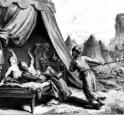Phineas Priesthood 2: The Tanakh
[ by Charles Cameron — continuing exploration of the Phineas story as it leads to the recent Larry McQuilliams incident among others ]
.
Phineas vs Zimri & Cozbi
.
I
Paradise is depicted in many traditions as a garden — indeed the very word “paradise” (pardes) means “garden” or “orchard” in Hebrew. It is a place where the divine presence “walks with man in the cool of the day” — glorious phrase — a green and fruitful garden, rich in beauty and tranquility, where the purity of love is unsullied by despair or hatred.
In our scriptures, myths and rituals, we give expression to all that is noblest and most generous in our nature: the “peace that passeth all understanding” manages somehow to cross the great Cartesian divide between mind and body, promising us both inner peace of mind, and external relief from war and strife.
All is not well in this garden, however. Along with the refreshing breezes and the sounds of voices lifted in praise, our scriptures and religions also offer us reasons for killing and warfare, divinely sanctioned injunctions to the sword as well as to peace. One of the recorded sayings of Muhammad teaches that Paradise is found under the shade of swords.
Christ, too, is reported to have said he “came not to bring peace, but a sword”.
Like a perennial landmine in paradise garden, the story of Phineas (also spelled Phinehas or Pinchas) lies await in the Tanakh / Old Testament for some reader to take a wrong step and explode it once again.
Introducing this series in Phineas Priesthood I: Larry McQuilliams, I said:
Since I shall be discussing how the tale of Phineas / Pinchas / Phinehas has been used as offering divine scriptural sanction for acts of religiously-motivated killing, I shall chiefly focus on the negative implications of the tale .. Accordingly, I’d like to invite my friends in the Jewish and Christian scholarly communities, in particular, to assist me in the comments section by suggesting alternative ways of reading a story which in its most literal interpretation has been the cause of untimely and hateful deaths
That goes for the series as a whole. In later posts in this series I shall follow the trail of Phineas (the lone wolf) and touch on the Maccabees and Zealots (his “group” equivalents), first in the ancient world, and then more recently.
II
The story of Phineas is told in the book of Numbers / Bamidbar, chapter 25:
While Israel dwelt in Shittim the people began to play the harlot with the daughters of Moab. These invited the people to the sacrifices of their gods, and the people ate, and bowed down to their gods. So Israel yoked himself to Baal of Peor. And the anger of the Lord was kindled against Israel; and the Lord said to Moses, “Take all the chiefs of the people, and hang them in the sun before the Lord, that the fierce anger of the Lord may turn away from Israel.” And Moses said to the judges of Israel, “Every one of you slay his men who have yoked themselves to Baal of Peor.” Take all the chiefs of the people, and hang them in the sun before the Lord.
In all likelihood, I must have heard this passage read aloud at least once before the age of eighteen in the chapels of the British boarding schools I attended — yet I have no vivid childhood memory of a God who encourages mass hangings out in the open air. The God of my childhood and schooling was caring, loving, far-seeing (which I understood to be one of those divine omni-attributes, thus distinguishing him from my parents or teachers), and wise.
Page 1 of 3 | Next page
